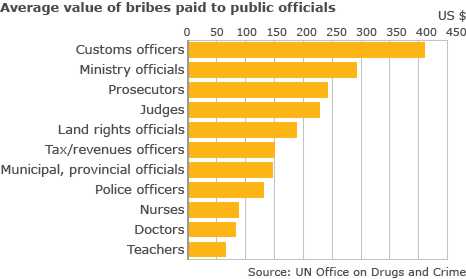Afghans paid $2.5bn (£1.5bn) in bribes over the past 12 months, or the equivalent of almost one quarter of legitimate GDP, a UN report suggests.
Surveying 7,600 people, it found nearly 60% more concerned about corruption than insecurity or unemployment.
More than half the population had to pay at least one bribe to a public official last year, the report adds.
The findings contrast sharply with a recent BBC survey in which the economy appeared to top Afghan concerns.
The survey commissioned by the BBC and other broadcasters in December suggested that fewer Afghans (14%) saw corruption as the biggest problem than the economy (34%) and security situation (32%).
According to the UN survey, bribes averaged $160 (£98) in contrast to an average Afghan annual income of $425.
Bribes were most often paid to police, judges and politicians but members of international organisations and NGOs were also seen as corrupt, the survey said.

Average value of bribes paid to officials according to UNODC.
Antonio Maria Costa, head of the UN Office on Drugs and Crime (UNODC), said corruption was contributing to drug-trafficking and terrorism in Afghanistan.
The UNODC said its report, Corruption in Afghanistan, was based on interviews with 7,600 people in 12 provincial capitals and more than 1,600 villages around Afghanistan.
The BBC survey, which was also nationwide, was based on a smaller number of people (1,534).
Explicit demands
According to the UN survey, 59% of Afghans said their daily experience of public dishonesty was a bigger concern than insecurity (54%) or unemployment (52%).
In 56% of cases, the request for illicit payment was an explicit demand by the bribe-taker, it said.
In three out of four cases, bribes were paid in cash.
Around one in four Afghans surveyed had to pay at least one bribe to police and local officials during the survey period while between 10 and 20% had to pay bribes either to judges, prosecutors or members of the government.
"The Afghans say that it is impossible to obtain a public service without paying a bribe," said Mr Costa.
"Bribery is a crippling tax on people who are already among the world's poorest," he added.
'Perverse and growing'
Another finding of the survey is that at least one in three Afghans believed that corruption was the norm.
Only 9% of the urban population ever reported an act of corruption to the authorities, the survey said.
There was also a perception among 54% of Afghans that international organisations and NGOs were corrupt and "in the country just to get rich", the survey added.
"This perception risks undermining aid effectiveness and discrediting those trying to help a country desperately in need of assistance," the UNODC said.
Mr Costa noted the emergence of a "new caste of rich and powerful individuals who operate outside the traditional power/tribal structures and bid the cost of favours and loyalty to levels not compatible with the under-developed nature of the country".
"Criminal graft has become similarly monumental, perverse and growing and is having political, economic and even security consequences," he said.
He expressed his concern that the lack of confidence in the Afghan authorities apparent in the survey was making the Taliban's advocacy of "more violent forms of retribution... treacherously appealing".
"It's time to drain the swamp of corruption in Afghanistan, to stop money and trust disappearing down a big black hole," the UNODC chief concludes.
"Corruption is the biggest impediment to improving security, development and governance in Afghanistan."



